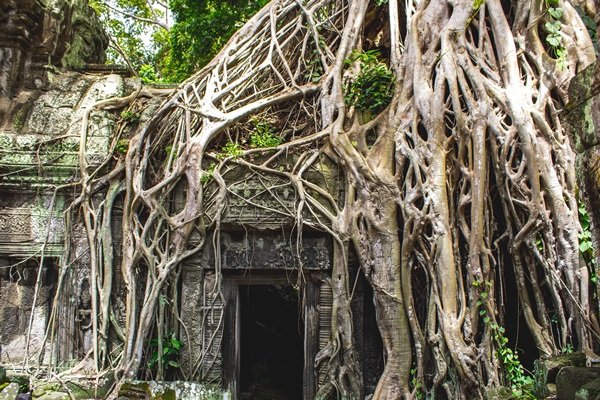The Slacker's Guide to the Great Remission: UNTYING THE KNOT: THE PARADOX OF CIVILIZATION

The term civilization connotes ideas of genteel refinement, cooperation and stability—a showcase of man’s great works, of vast metropoli filled with people and engineered environments where Nature is harnessed to serve the needs of all mankind.
Given the facts of civilization, however, this is oxymoronic. The idea that civilization is a positive cultural state may be the most difficult installed mental program we have to overcome to be truly free. Far from being desirable, civilization is enslavement and environmental degradation. What do all dead civilizations leave behind as their legacy? Ruins. Civilization ruins.

Civilization’s etymological root is “civil,” pertaining to city, ultimately to governance. Civilization is cityfication. To be governed is to be controlled, the same way a governor on an engine keeps it at a constant rpm regardless of its workload. Think of a whip snapping across a slave’s back to keep him from slowing down.
To be a “civilized” person is to control one’s actions within a structured, hierarchical society, to know one's place and obey. Civilization controls by enforcing restrictions from without, beginning with childhood socialization of etiquette, ending in threats of violence if the social mores are not followed. Ultimately, it is a tool of the fear-filled pathologically ambitious who aspire to positions of power and control. As long as there’s an institution with a power seat, paranoid psychopaths will be clawing their way into it.
Let’s face it, like Latin American soccer stadiums, civilizations have a tendency to collapse. It’s a perennial cycle. They collapse because all civilizations create hierarchy, a few privileged elites at the top supported by a huge foundation of dependent underclass on the bottom. Civilizations rely upon slavery for their support while simultaneously degrading the environmental substrate upon which all life depends. Eventually the excesses of civilization lead to environmental debasement, the slaves begin to suffer, tire of their enforced servitude and revolt and it all comes crashing down.
Let’s make the next Great Depression even Better!
CZ
To survive the inevitable collapse, It is imperative that some people relearn how to live outside of a highly organized, centrally administrated society. If we are ever going to regain our sense of self, family and community, we must relearn the ways of Nature.
Slackers know that certain philosophies foster inner peace and peace between individuals. They contemplate these self-evident truths and adopt them as their own. They believe in and practice awareness and self-control and therefore have no personal need for the overburden of civilization.
Civilization parasitises the Earth. Neolithic hunter-gatherers lived off what was available: game, berries, roots, seeds, nuts and fruit. They lived in symbiosis with Nature, honoring her, partaking of their surroundings, moving on when conditions dictated.
Civilization began when man realized that he could manipulate Nature to better serve his needs. The most obvious manipulation involved the planting of seeds. Indeed, this may be what the parable of Adam and Eve in the Bible is really about. To “eat of the fruit of the tree of the knowledge of good and evil and be as gods,” might refer to the moment that our caveman forebears realized that seeds begot plants and that taking charge of a plant’s life cycle favored growth and increased yield. That one bit of knowledge allowed humanity to flourish and become the most dominant animal alive today.
How in the world, you may be wondering, could this possibly be a bad thing?
Problems arose when instead of following the antelope or moving into the mountains for the acorn harvest, our hunter-gatherer-turned-farmer realized he must stay with and guard his crop until it matured. Agriculture makes more food available and the man who occupies the most fertile land will have the most food. The farmer’s tribe flourished. With no need to migrate he built permanent shelters. Freed of the need to carry his possessions with him, accumulation began. The accumulation of possessions, especially croplands, created a situation wherein the farmer must protect his spoils from the surrounding nomadic hunter-gatherers who, forced to barbarism by the acquisitive and self-centered lifestyle of the farmer, banded together to take his rapacity for themselves. Conflicts escalated to bloodshed.
This is also true of the semi-nomadic herder. Domesticated wild animals depend on humans for protection and require a succession of fresh pastures to graze. The best pastures grow the healthiest animals, which in turn, produce the largest herds. Territoriality arises.
During times of peace, the farmer is able to trade his surplus food for other things that he may need like skins or even labor which increases his wealth and elevates his power and status above those who cannot or do not choose to occupy land.
Territory farmed is land removed from the hunter-gatherer leading to his impoverishment. The farmer recruits the hungry as laborers by paying them with food or by arresting them and forcing them to work. He soon realizes that getting others to do the labor of growing the crops and managing the slaves increases his yields and allows him to expand his territory, further increasing his power. Slaves quickly become dependent on their masters and willingly fight to increase his territory and their own security. Power is the most addicting drug of all, especially to a psychopath. Hierarchy arises.
The most destructive element of agriculture however is one simple idea: The farmer now views himself differently. He is no longer a part of the natural cycle of things but a manipulator of it. His sustenance is no longer a gift but something he wrested from his surroundings by his own efforts. He feels that his good or bad fortune depend on mysterious forces that reflect his human desires. Now fully delusional, he anthropomorphizes these forces into deities then petitions these gods to do his bidding or in some way placates them to grant him favor.
Since agriculture takes more effort than hunting or gathering he feels it is his genius, hard work and favored status that creates his wealth and those who do not participate in his efforts have no rights to any of its fruits. Herein is where civilization begins, conflict arises and Eden is lost.
It probably started something like this:
“Hey, Dude, what you got there?”
“I call it bread.”
“Smells good. Where’d you get it.”
“I made it.”
“You made it?”
“Yeah. I planted some seeds, grew the grain, pounded it with a rock, lit a fire and made it into bread.”
“Whoa. That wasn’t easy.”
“No.”
“Gimme a bite.”
“Piss off.”
“Dude, that’s not the way it’s done. Here, take some of these grubs I just gathered.”
“No thanks, I’m a vegetarian.”
“You’re a what?”…
Civilization is born.

To be continued...
Preface part 1, part 2
Introduction
Why Slack? part 1, part 2
The Purpose of Life